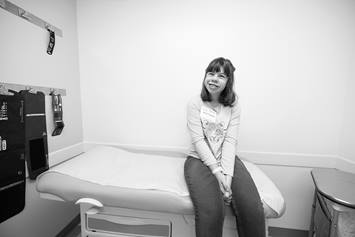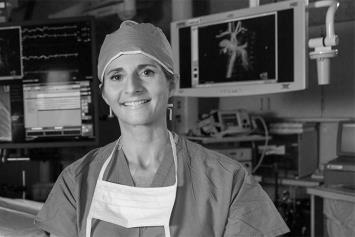Williams Syndrome
Children born with Williams Syndrome have many symptoms, including unique facial features, issues with their heart or blood vessels (cardiovascular), and cognitive or developmental delays.
What Is Williams Syndrome?
Williams syndrome, also called Williams-Beuren syndrome, is a rare condition caused by the loss of several genes from chromosome 7. Since it is genetic, WS develops before birth. It affects about 1 in 7,500-10,000 people worldwide. Some of the main features include a unique facial appearance, heart (cardiovascular) problems, and short stature.
People with Williams syndrome typically have an outgoing and engaging personality, but they may also have developmental and learning delays. Early intervention, medical care and educational support can help manage the symptoms and improve quality of life.
What Are the Causes of Williams Syndrome?
Williams syndrome happens when someone is missing 25-27 coding genes, or a small piece of chromosome 7. This deletion happens at conception and is not caused by anything the parents did or did not do.
What Are the Signs and Symptoms of Williams Syndrome?
Williams syndrome is characterized by a group of symptoms, some of the most common include:
Characteristic Facial Features
- Wide mouth with prominent lips
- Upturned nose
- Fullness around the eyes
- Widely spaced teeth
Cardiovascular
- Supravalvular aortic stenosis: narrowing of the aorta, the main artery that carries blood from the heart to the body
- Pulmonary artery stenosis: narrowing of the pulmonary arteries that carry blood from the heart to the lungs
- High blood pressure, sometimes caused by narrowing of the blood vessels that carry blood to the kidneys
Developmental Delays
- Delayed speech
- Delayed motor skills
- Learning disorders
- Intellectual Disability
Mental/Behavioral Health
Personality
- Sensitivity to loud noise
- Very social and outgoing
Endocrine
- Low thyroid hormone (hypothyroidism)
- Insulin insensitivity (pre-diabetes)
- High calcium levels in the blood or urine
- Early puberty
Gastrointestinal and Feeding Problems
- Colic/irritability in infancy
- Difficulty sucking and swallowing
- Low birth weight/slow growth
- Constipation and/or diarrhea
- Diverticular disease (in adults)
How Is Williams Syndrome Diagnosed?
There are several DNA tests that can determine if a person has Williams syndrome. The most common test used to diagnose WS today is the chromosomal microarray (CMA). In the future, genome sequencing may replace the CMA as the test of choice. Your doctor will also complete a medical history and physical exam. Other blood tests may be done at the same time to check various aspects of health based on a likely WS diagnosis.
How Is Williams Syndrome Treated?
While there is no cure for Williams syndrome, certain aspects of the WS diagnosis do require screening and therapeutic intervention. Multiple doctors and therapists will collaborate to help families best care for their family member with WS.
The Williams Syndrome Care Team at Nationwide Children's
Our care teams include central physicians (usually a geneticist or developmental pediatrician) and specialists (cardiologist, psychologist, endocrinologist, nephrologist, gastroenterologist, therapy services and more) chosen to meet each person's health care needs. Because the team works together, everyone’s care plan includes shared input from all involved disciplines and is optimized to incorporate the most up to date research findings. Since 2007, families caring for children and adults with WS from the U.S. and around the world have traveled to our clinic for specialized care.
Engaged Team Members include specialists from:
- Cardiology
- Developmental Pediatrics
- Developmental Services (physical therapy, occupational therapy, speech therapy, etc)
- Endocrinology
- Genetics
- Nephrology
- Psychology
- Social Work
Meet Our Williams Syndrome Team
Our clinic collaborates with The Heart Center at Nationwide Children's, including nationally renowned interventional cardiologists and cardiothoracic surgeons. We also have a world-class team of cardiac anesthesiologists that work closely with the WS team cardiologist, to manage the care of patients undergoing cardiothoracic surgery and other procedures. Additional collaboration services are available from:
- Adult congenital heart program at Nationwide Children's Hospital/ The Ohio State University Wexner Medical Center
- ENT/ Audiology
- Gastroenterology
- Ophthalmology
- Orthopedics
- Radiology/imaging services
Our team aims to provide collaborative, innovative and up-to-date care which is personalized for every patient, including management of medical, behavioral, and mental health. Our core team of providers has many years of experience in caring for children and adults with Williams syndrome and can provide help with surgical consultation, medical management, and behavioral strategies aimed at preserving physical and mental health.
Clinical Research
Our team regularly engages in clinical research related to Williams syndrome including the Collaborative Registry for Williams syndrome (CReWS) and Nationwide Children’s research program in the Steve and Cindy Rasmussen Institute for Genomic Medicine and presents at national meetings and conventions.
To refer your child for an evaluation in the Williams Syndrome Clinic, please call (614) 722-6160.



